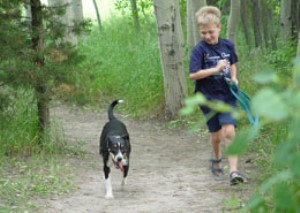18 January 2016
64% of companion animal vets are concerned about obesity and overfeeding in dogs
With the festive period just behind us and Easter eggs beginning to fill shop shelves, the British Veterinary Association is offering advice on how to avoid expanding waistlines with some top tips on how owners can combine caring for their dog with their own fitness campaign.
BVA survey identified obesity as the number one animal welfare issue that concerned all vets, with 64% of companion animal vets stating obesity and overfeeding as their top concern.
Gudrun Ravetz, Junior Vice President of the British Veterinary Association, said:
“It is never easy to motivate yourself to get up a bit earlier on a cold, dark winter morning to take the dog out, but it is worth it. The dog is always pleased to see you and keen for a walk. We are a nation of dog lovers so let's show it by spending some quality time with our pets out on a walk – it will look after their physical and mental health and it really is good for owners too!"
Exercise is great for a human's physical and mental health, and this applies for a dog's too. Taking a dog for a walk or run costs much less than a gym membership and is much more fun and rewarding – it also aids in creating a closer bond between owner and dog, which can have a great positive impact on everyone's wellbeing.
It also combats the well-known health risks that can come with being overweight such as diabetes, cardio-respiratory disease and joint pain.
Here are some top tips for improving your dog's fitness:
- Go the extra mile – do an extra circuit around the local park or go a bit further on country walks, but remember that your dog should be on a lead in the countryside when there is livestock around
- Think toys not treats – toys that a dog can play with and get fun exercise from can get that tail wagging as energetically as treats can
- Join a club – lots of vet practices run fit clubs and weight-control clubs
- Get the right diet – make sure that your dog's diet is right for its breed, size, age and lifestyle
- Ask your local vet – your local vet will know and be able to offer the best advice on your pet and its needs
If in doubt about your pet's health, exercise regime or diet ask your local vet.



